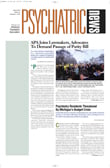Physicians who believe that they have few options except to sign “take-it-or-leave-it” contracts with insurance companies will find hard facts to support their views in “Competition in Health Insurance: A Comprehensive Study of U.S. Markets.”
That report, released by the AMA late last month, found that a significant number of insurance markets are “highly concentrated,” according to standards developed by the U.S. Department of Justice and the Federal Trade Commission (FTC). In a large number of these markets, according to the report, a single insurer has a market share of more than 30 percent, and in a number of markets, the market share is as high as 40 percent or 50 percent.
The study, which was a joint effort of AMA’s Private Sector Advocacy unit and the AMA’s Center for Health Policy Research, came about because of physician complaints about lack of bargaining power with insurance companies and the perception that the insurance market was rapidly consolidating. The first step in determining the realities of the marketplace was “to obtain a real measure of health insurer market power and market concentration,” according to the report.
With the guidance of health economist Stephen Foreman, the study team measured market concentration by using the Herfindahl-Hirshman Index (HHI) and individual insurer market shares. The HHI is a mathematically derived index of market concentration used by the Department of Justice and the FTC to evaluate the impact of proposed mergers on competition in markets. According to DOJ/FTC guidelines, a market is deemed “highly concentrated” if it has a HHI score of more than 1800.
For the 40 Metropolitan Statistical Areas (MSA) that are large (population over 1 million), the study revealed these findings:
• In the combined HMO/PPO market, 47.5 percent of the large MSAs are highly concentrated (HHI >1800).
• In the HMO product market, 69.8 percent of the large MSAs are highly concentrated.
• In the PPO product market, 87.5 percent of the large MSAs are highly concentrated.
• Large national health insurers dominate a number of the highly concentrated MSA HMO markets, while regional Blue Cross and Blue Shield companies have dominance in the highly concentrated PPO markets.
For 19 less-populated states (populations less than 5 million), with no available MSA data, the study revealed these findings:
• Eighty-four percent of these states have highly concentrated combined HMO/PPO product markets.
• One hundred percent of these states have highly concentrated HMO product markets.
• Eighty-nine percent of these states have highly concentrated PPO product markets.
• In 76 percent of the 19 state-level markets, a single insurer has a market share in excess of 40 percent.
Policy implications include the “need for stricter scrutiny of health plan mergers and acquisitions” and “support for initiatives to provide antitrust relief for physicians, thereby enabling them to operate as a countervailing market force,” according to the report.
The report can be obtained from the AMA for $50 for members and $100 for nonmembers, plus shipping and handling charges, by calling (800) 621-8335 and asking for publication OP427101. ▪
